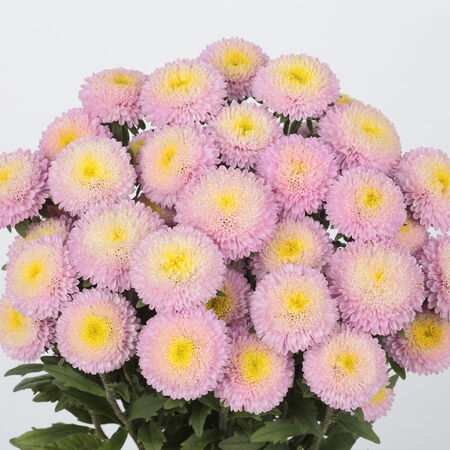Bonita Shell Pink, Aster Seeds
Key Attributes
Key Attributes
Product Details
Weight
0.008Depth
0.1Height
4.5Width
3.25Plant Height
32-36"Botanical Name
Callistephus chinensisFlower Height
32-36"Seed Type
SeedAdditional Characteristics
Attracts Pollinators, Attracts Birds, Deer ResistantSeeds Per Gram
487Seeds Per Pound
220,800Packet
50 SeedsSow Depth
1/16"Seeds Per Ounce
13,800Breed
Open-pollinatedSun
Full SunGrowing Conditions
BordersUses
Cut FlowersLife Cycle
AnnualSow Method
TransplantCategories
FlowersDays To Maturity (# Days)
115Components
Growing Instructions
![]() Learning Download: How to Grow Aster
Learning Download: How to Grow Aster
Aster is a perennial, which means it comes back year after year. Aster flowers can reach up to 8 feet tall depending on the variety, and the flowers will attract butterflies to the garden.
Before Planting: Begin Aster seeds indoors in small pots six weeks before the last frost. Cover the pots with a plastic bag to keep the environment warm and moist. Seeds should sprout within 10 days. Remove plastic once the seeds sprout.
Planting: once seedlings are 6 inches tall, transplant them outdoors. Space them 18 inches apart.
Watering: Aster flowers require 1 inch of water per week.
Fertilizer: Each spring, add a 2-inch layer of compost around the Aster flowers.
Days to Maturity: Aster flowers will bloom into the late summer and early fall.
Harvesting: To harvest, cut the stem low to the ground and check for insects that may be hiding in the stem, flowers or leaves. Bring the cuttings indoors and place in water immediately.
Tips: They grow better when trimmed lightly and when their dead flowers are deadheaded.
Shipping Schedule
Our Seed Promise
 "Agriculture and seeds" provide the basis upon which our lives depend. We must protect this foundation as a safe and genetically stable source for future generations. For the benefit of all farmers, gardeners and consumers who want an alternative, we pledge that we do not knowingly buy or sell genetically engineered seeds or plants.
"Agriculture and seeds" provide the basis upon which our lives depend. We must protect this foundation as a safe and genetically stable source for future generations. For the benefit of all farmers, gardeners and consumers who want an alternative, we pledge that we do not knowingly buy or sell genetically engineered seeds or plants.
The mechanical transfer of genetic material outside of natural reproductive methods and between genera, families or kingdoms, poses great biological risks as well as economic, political, and cultural threats. We feel that genetically engineered varieties have been insufficiently tested prior to public release. More research and testing is necessary to further assess the potential risks of genetically engineered seeds. Further, we wish to support agricultural progress that leads to healthier soils, to genetically diverse agricultural ecosystems, and ultimately to healthy people and communities.
To learn more about the "Safe Seed Pledge" please visit www.councilforresponsiblegenetics.org.

